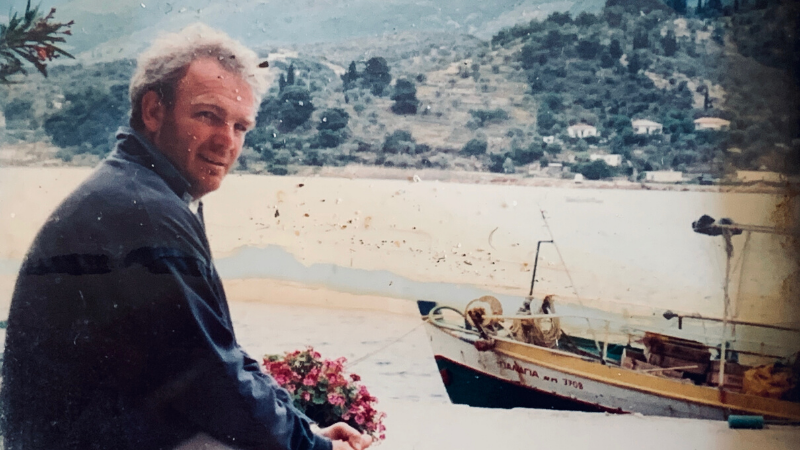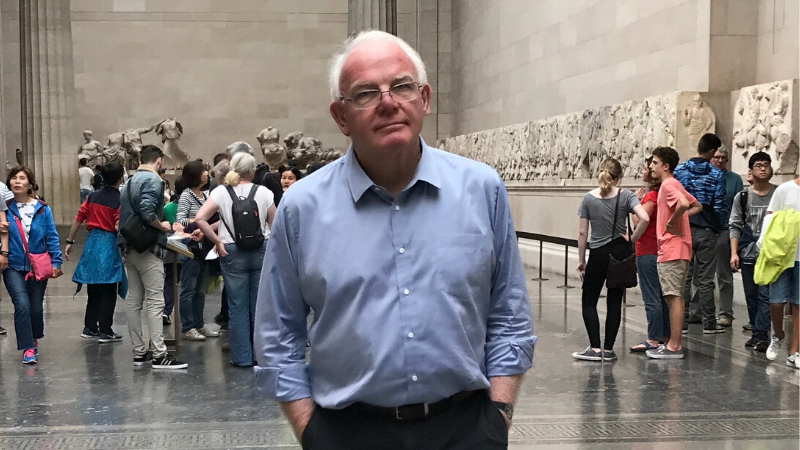Supporter Q&A: David Hill
May 7, 2020
Author & Chairman of Australians for the Return of the Parthenon Sculptures
With a personal connection to Poros and Galatas spanning almost 50 years, philhellene David Hill was delighted to support Pedtrauma’s upgrade of children’s health facilities at the Health Centre of Galatas, though a designated gift to THI Australia.
When did you first visit Greece?
It was 1973. A mate from Australia who was on his way to a job in London stopped off in Greece went on one of those ferry island cruises that stopped on Poros. When he got to London, he wrote to a group of friends and said, “I’ve found the perfect place for lunch”. So, I went to meet up with my Australian mates in Poros.
I was already in love with Greece before I got there. Kazantzakis had written Zorba the Greek, and I’d read that and then the film came out with that fabulous music score by Mikis Theodorakis. To arrive off a plane early morning and go down to Piraeus in that Attic sunlight, the blue, the sky, the music, the sounds, the attraction was instant. I stayed most of the summer in Poros in ‘73 and went back for the next three years. I would work winters in London and spend summers in Greece, largely based in Poros.
What is your personal connection to Poros and Galatas today?
I’ve still got friends that I met that first year. We’ve all grown old together. I have a little house on the back of Poros, 10 steps into the water. It’s just a beautiful spot. Greece became my second home. I would have gone back once or more every year, sometimes several times in one year. I am devoted to Poros and Galatas. It’s much the same place, separated by 150 metres of water from the mainland. They run little shuttle ferries between Poros to Galatas 24 hours a day. I swam it once after drinking a lot of ouzo.


How has your relationship with Greece changed over the years?
In those early days it was a party, we drank a lot and danced all night. The relationship became deeper and richer and, for well over 20 years now, I’ve been very involved in the international campaign to persuade the British to give back the Parthenon sculptures. From 2005 until 2016 I was the foundation chairman of an international organisation campaigning for the return of the marbles. That really is indicative of the deeper connection I have with Greece and its heritage and aspirations.
What project have you been working on in Galatas?
I went back to university in 2006 and graduated in classical archaeology. Since 2011, I have been the project manager of an archaeological study at Ancient Troizen, the legendary birthplace of Theseus. It’s about 6km from Galatas up in the mountain. I have been working with a team of volunteers from Germany and Australia doing a survey using modern technology to create a map of the Ancient City of Troizen. It’s quite a big settlement and we know quite a bit about it from Pausanias’ travels in Greece. We don’t dig. We were using satellites to get an accurate picture of the perimeter of the city, which is about 3km long. I usually go for a month or two in September and October, which is the most beautiful time to be there, and that’s when we work solidly on the archaeology survey.
How have you felt watching the economic crisis in Greece unfold over the past 10 years?
It’s just been heartbreaking. It used to be in the news, Greece’s financial and economic crisis, and people think it has got better but it hasn’t. It’s just no longer news. It has been compounded by massive, desperate immigration by people who want to go on to Europe but can’t get out of Greece. The Greeks are very humanitarian and they are not going to turn their backs, they do what they can, but it’s put a huge strain on a terrible economic situation.
Why did you choose to help with the Galatas Pedtrauma hospital project?
I know the Health Centre well. We’ve used it when archaeologists have had a cut or a suspected broken arm. I think I got an x-ray there once years ago. The conditions are indicative of every single piece of social infrastructure in Greece, which is suffering. It’s a heroic job that they do with the resources and facilities that they have. When Stergitsa (his wife and THI Australia CEO) mentioned Pedtrauma needed funds for medical equipment for children, I thought it would be terrific to be able to make a modest contribution to the centre in Galatas.
How important is it for Philhellenes and the Greek diaspora in Australia to be part of Greece’s renewal?
Most Australians who visit Greece come away with a great sense of attachment and a great sense of spiritual connection. If they are made aware of just how tough Greece has been doing it, I think there is a potential source of support there. I know very few Australians who have gone to Greece and not proudly described themselves as Philhellenes or felt a loyalty to Greece and its aspirations, I certainly do.